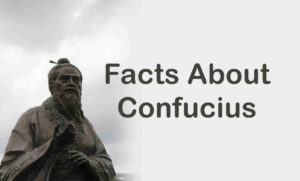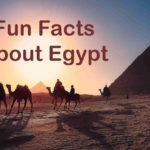Top 11 Facts About Confucius That Everyone Should Know

Confucius
Confucius was born in 551 BC in the small state of Ch’in. He was not a nobleman but came from the artisan class. He became known for his wisdom and, at the age of 68, he was invited to become a teacher at the royal court.
He had many disciples and founded an academy which does not exist today. Confucius died when he was 71 years old. His work is still studied today by students of literature, philosophy, religion and Eastern cultures in general; this includes China as well as Korea, Japan, Taiwan and Vietnam.
He is best known for his first book, the Analects, which covers a wide range of subjects. He taught calmness and gentleness but was also an astute political observer and foresaw many of the problems that would face China.
Confucius stressed that all men are brothers and must be treated justly. He emphasized the importance of education and honesty in all endeavors. Confucius believed that if a person studies hard enough, they can master any subject.
Confucianism is practiced today in China but does not exist as a full-fledged religion with temples and priests as it once did. It is practiced in the form of government, education and family. It is taught as part of Chinese history and culture but does not have a strong following.
Throughout history, there have been many men who were influenced by Confucianism. These include:
In the West:
In modern China today, Confucianism is often applied to daily life in this way. If an individual were to attend a party in China, they would be expected to bring a gift for their host. The gift would be expected to reflect both the status of the host and that of the guest as well as the relationship between them. In modern Beijing, this might involve buying something expensive at a department store and then bringing it wrapped in fancy wrapping paper with ribbons attached. This is a clear example of how Confucianism is still applied in everyday life in China today.
Confucians are also very cautious and conservative in their beliefs. They do not believe in the concept of diversity, which means that they have generally no tolerance for any differing views or religions. They think that there is only one right way to live and consider this correct life-form to be an ideal true to the Confucian spirit of social order. This, in turn, means that all other religions are seen as either being wrong or wrongheaded simply because they are an eclectic mix of many different practices and teachings. Most Confucians have a strong belief in traditional Chinese culture and do not accept westernizing influences such as democracy or capitalism.
How Confucianism is practiced today:
Confucius is not a founder of a religion, yet Confucianism has been influential in Chinese culture throughout the centuries. It is influenced by Buddhism, Taoism and the Song and Ming dynasties. The traditional Chinese way of life is considered to be good and stable because it was created by those who were wise, honest and have strong moral values. This means that Confucians would consider both Republicans (the Democrats) and Communists (Capitalists) to be people who are morally weak and would want what they want regardless of the consequences for others.
Confucianism allows for the possibility of other religions and different outlooks to exist but only if they are not straying from what is considered to be the true way of life. This might create an environment where religious tolerance is not apparent and Confucians are intolerant of any practices that differ from their own.
Another area where Confucius and mainstream Confucianism would differ from modern Western religion is in how responsibilities are distributed. To a much greater degree, Confucianism puts in place laws, systems and hierarchies to rule over its disciples and followers. These hierarchies are normally not based on individual ability but are instead based on a societal system.
As a means of solving issues, Confucians only choose one way of dealing with problems. They believe that everyone is equal only in the sense that they are all exactly the same. There is no room for individuality then, as it would be considered to be wrong and against the wishes of divine nature. This view does not consider all other ways of dealing with issues possible, which might include democracy or capitalism.
Confucians also believe that humans have their own innate spiritual side to them, one which they can use to help them consume things more easily without being greedy and overly selfish. Confucians do not believe in karma, which some religions do. Instead, Confucians believe that humans are all inherently perfect and that they cannot be judged by their actions.
The Confucian way of life has survived for thousands of years whilst many other ancient cultures have died out or faded away into history. This shows how successful the teachings of Confucius have been. Many people live their lives based on his teachings today as a guiding light. At the same time, some people would argue that Confucianism is no longer relevant to modern society – this view stems from an initial misunderstanding of what it actually taught but it is still widely accepted as the truth within the Chinese culture.
1. Basic ideas of Confucianism:
a) Treat others in a good way.
b) Be courteous and follow routines every day.
c) Moral and ethical standards of a man should be sound.
d) Family was important and one’s ancestors were to be respected.
e) A true man must-have attributes of integrity, loyalty, benevolence, rightfulness, and self-sufficiency.
2. The birthplace of Confucius was Qufu
Confucius was born at a time when the Zhou Dynasty was developing rules, including a system of laws. His father died when Confucius was young and his mother raised him.
He became an expert on traditional rites and music, which he learned from his mother, before moving to the state of Lu as a grown man where he eventually became an official. Confucius spent his life trying to make sense of the political chaos that existed in China before the Qin Dynasty (221-206 BC) established one unified rule across all of China.
Qufu is a city in the region of Shandong in Eastern China. Confucius was born in 551 BC and died in 479 BC. The city is located near the Jishui River, which is called the Ruo Shui or Pei He in ancient times. Qufu’s nickname is “The City of Respect for Tradition.”
3. Confucius was a great diplomat, politician, teacher and more
Confucius is one of the most well-known figures in Chinese culture and history. He has been celebrated by thousands for centuries because of his wisdom and teaching methods. Even today Confucian ideas are still used by some Asian nations as a way to better understand how to live their life’s correctly.
Confucius said, “To know others is a kind of knowledge; To know yourself is true wisdom.” Confucius may have been the great-grandfather of modern China. He has endured as a symbol throughout history and into modern times. China’s political, social, economic, educational and philosophical system originated from Confucianism. The principles of Confucianism still form a vital part in the life of every Chinese citizen today.
4. There are two outstanding characteristics that are usually associated with Confucius
“humaneness” and “moderation. ” Humaneness is the universal virtue that Confucius believed all human beings should possess. It includes honesty, politeness, compassion and more. How far a man goes in life depends on how deeply he has embraced this virtue.
Confucius believed that if one was too honest or too polite, he would become a laughingstock. However, these two qualities are not mutually exclusive and in fact they are often complementary. For example, if you are being lied to, it is best to be more polite than honest because you may offend the liar. If you are honest, then it is not necessary to be so polite, unless you want to.
The second virtue of Confucius is moderation. Moderation in all things is a key feature of his doctrine. It means that one does not have to do something very much or too little – it should be just right. This virtue also involves not doing any one thing excessively and not letting emotions get out of control. Thus one should live with “Li”. Li means moderation and a sense of balance or harmony in everything we do in life. Moderation came from the balance of opposing virtues and carrying out actions with self-restraint. This is exemplified in Confucius’s famous quote “Do not do to others what you do not want them to do to you. ”
5. Five cardinal relationships
“The Five Human Relationships” are the rules for the relationships between ruler and minister, father and son, husband and wife, older sibling and younger sibling, and friend to friend. In these relationships, each person must love the other as much as he or she loves him or herself. The ruler must love his ministers as much as he loves himself. The father must love his children as much as he loves himself. Husbands must love their wives as much as they love themselves… Older siblings must treat their younger siblings with kindness, the way they would want someone to treat them if they were younger… Friends should also act this way towards each other… (Analects 3:2-8)
6. The Analects
The Analects was written by Confucius’s student named Tsekung Te Zeng I (551 – 479 BC). It is an important collection of Confucian teachings. The primary author, Tsekung Te Zeng I, is one of Confucius’s most famous disciples. The book was first written in classical Chinese and was translated to an early form of Classical Chinese (the so-called “simplified” style), From the Han dynasty onward, it was composed in Classical Chinese. It serves as a source on Confucius’s teachings.
One of the most famous passages from the Analects is called “Three Obedience,” and it talks about students obeying their parents, superiors and society itself.
In the Analects, Confucius teaches a policy of “Do the best you can, and leave the rest to heaven.” According to classic Confucianism, human beings can only do their best in all their endeavors. They cannot shape the world or determine their destiny; they can only do their best. Thus, in an imperfect world with limited resources and opportunities, they should treasure what little they have while accepting with a good attitude what they cannot change.
7. Confucius was schooled in six arts
1) archery
2) equestrianism
3) ritual dance
4) music
5) calligraphy, and
6) mathematics, or geometry or astronomy (Jīng shū)
There is no evidence of Confucius having any higher education in the Western sense of the term, but he was undeniably a respected thinker who authored books on a variety of topics and was known for his sound moral judgment and respect for others as demonstrated by his willingness to take different views into consideration before making decisions about how to live one’s life or carry out one’s duties in society”.
8. Confucius’ mother raised him
His father died when he was three. He grew up in poverty with his mother, who raised him in the Chinese tradition of respect for parents and elders. He was a good son and she died when he was very young. Confucius learned to be a teacher from his father, an authority in the clan of the Shao family and one of China’s first scholar-officials. His father died when Confucius was three years old. The family was poor and at one point lived as guests in the home of a wealthy nobleman.
9. Confucius has approximately three million descendants
1) what is the given name of a Confucius descendant?
The given name of a Confucius descendant: Zhiming, or Tang Zhiming, was born on December 15, 1968, in Beijing. His topics include philosophy and religion. He is a professor at Renmin University in China.
2) What is the surname of a Confucius descendant?
The surname of an ancestor: “Zhuge”, “Zhwei”, “Ziyi”. His ancestors used Zhuge as their surname.
3) What about another type of relationship between Confucius and his descendants?
The relation of Confucius to his descendants in the other sense: Confucius’s descendants can be divided into direct descendants and collateral relatives. Only direct descendants are listed here. It is noteworthy that, in keeping with the Confucian ideal of respect for elder siblings, descendants always mention their elder siblings before mentioning their own names when mentioning their immediate family members; thus the seniority among siblings is preserved (e.g., the elder brother is always listed before his junior brother). For example, if someone’s name was Kong Li, he would be listed as Li Kong.
10. At the time he was 24, Confucius started his teaching career
Confucius started his teaching career by teaching at the age of 24. Confucius started his teaching career when he was 24. The first twelve years were spent in his native state, Lu, teaching adults and children alike
He established a reputation as a teacher and scholar, His fame increased when he wandered across the countryside and spread his teachings among the people.
It is said that Confucius compiled the Spring and Autumn Annals, which was a more accurate chronicle of history than anything before it.
Meanwhile, Confucius collected sayings from ancient rulers to help him govern men. He also wrote over twenty books covering all aspects of social life. These books helped to shape public opinion for centuries after his death.
11. The Five Classics of Confucianism were likely not authored by Confucius
Researchers have been debating the true, original author of the Five Classics for decades. While many scholars believe they were penned by Confucius himself, this has never been conclusively proven. All we have are multiple copies of ancient texts that seem to only perpetuate more confusion rather than provide any clarity about who actually wrote these influential political and philosophical texts.
In order to understand the authenticity and influence of these books, it is critical to examine their origins before embarking on any particular interpretation or analysis.
The Five Classics are Classic of Poetry, Book of Documents, Book of Rites, I Ching (Book of Changes), Spring and Autumn Annals.
Read more Facts and Knowledge

